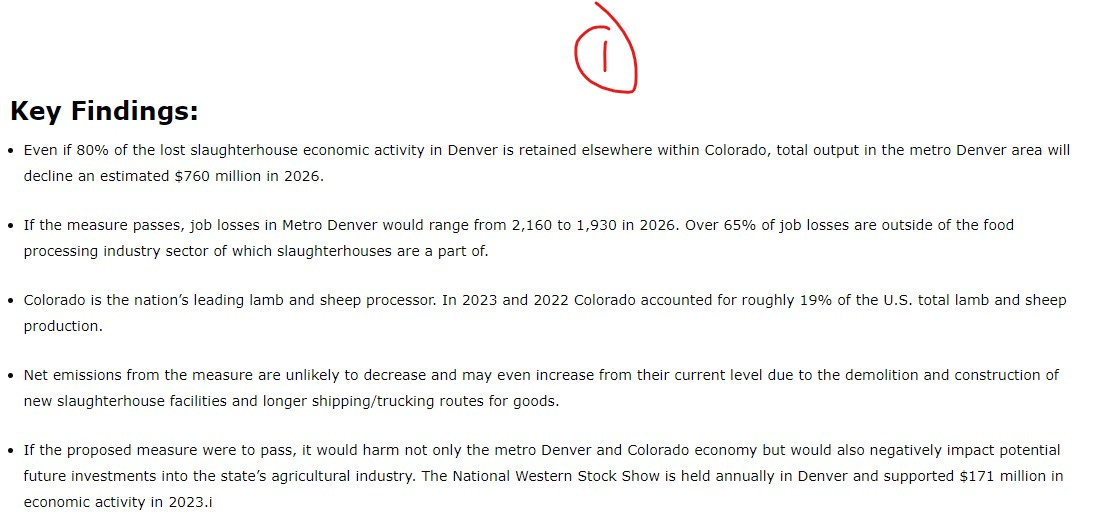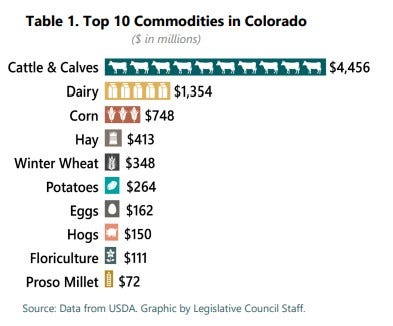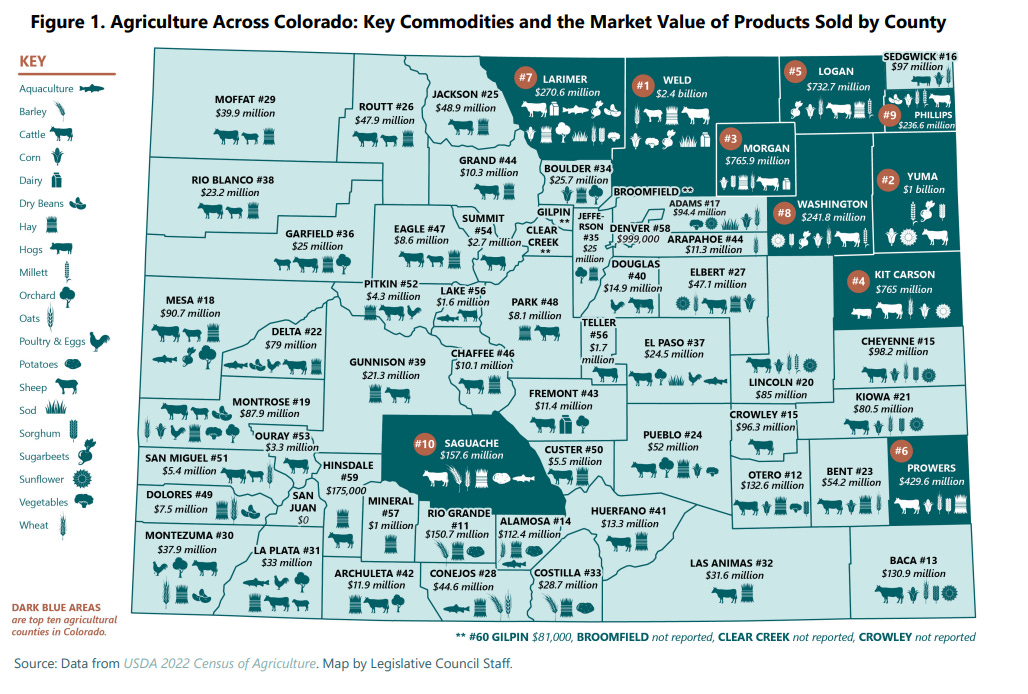Denver's ban on slaughterhouses is a bad idea and will not just affect Denver. Speak up. To drive the point home, a look at how big an industry Ag is in Colorado.
Denver's ban on slaughterhouses is headed to the ballot. If you don't live in Denver, you may just shake your head in wonder and move on with your day.
If that's the case, I urge you to resist the temptation. You should be speaking up regardless of where you live and you should be speaking to anyone you know who is a voter in Denver.
Reason being that plucking out one business in Denver (and that is what this ballot measure does) will send ripples through the whole state's economy, particularly in the Ag sector; as the graphic has it at the top of this post, there are a whole lot of hands that touch the products we consume.
Those hands are attached to humans. Humans who make their living, who feed their families, by doing something to a good and sending it down to the next step in the chain.
For further context on this, and as an aid in helping you advocate to those you know in Denver, I included a couple resources.
The first is a Common Sense Institute study on the economic impacts of a slaughterhouse ban. I attached the key findings of the study as screenshot 1.
The second is a FencePost article by Rachel Gabel about this initiative and a white paper** by a researcher from CSU. I gathered relevant quotes from different parts of the article and put them in screenshots 2 and 3. Some important context since I can't insert it into a picture: Martin is the CSU researcher Dr. Jennifer Martin, Superior Farms is the slaughterhouse in question, and it's important to note that this business is employee- owned meaning that shutting it down takes away not just the jobs but a significant amount of equity for a lot of people (and again, this is only the direct effect, not including secondary effects).
Speak up, share what you see in these articles with someone who gets to vote in Denver. The outcome of this ballot measure means much more than just urban progressives chalking up a win in their hometown.
**Definition of white paper: a government or other authoritative report giving information or proposals on an issue.
https://commonsenseinstituteco.org/the-economic-impacts-of-the-proposed-denver-slaughterhouse-ban/
https://www.thefencepost.com/news/slaughterhouse-ban-vote-sets-tone-for-local-food-innovation/
Related:
I want you to take note of how much coverage (and by whom) this ballot measure gets.
I want you to take note of which politicians speak up (or don't) about this.**
They have a chance to define their values, they have a chance to inform. If they don't, that tells you what you need to know about what they value, what they really think important.
**And don't let them say they stay above the fray on things like this, as you can see in the articles linked below, when it's important to them, politicians (even savvy career politicians like Polis) speak out about local races.
https://www.cpr.org/2024/07/31/rtd-board-elections-jared-polis/
https://kdvr.com/news/politics/colorado-politics-news/polis-endorses-primary-candidates-except-for-one-democratic-incumbent/
How big an industry is ag in this state (including the industry surrounding Denver's only slaughterhouse which I cover in the first post)?
I wanted to stay on the topic of agriculture for one more post. I was down in the Arkansas River Valley recently and in the course of meeting some people there, one of them mentioned how big an industry Ag is in this state—especially given how little mention it gets along the Front Range.
In case you wondered how big it was and just what exactly our state produces, I thought I would share with you a March 2024 report prepared by the Legislative Council Staff. It’s linked first below.
I’ll leave it to you to read the report in full, but I did pull some highlights worthy of special mention.
--Check out the graphic at the top of this post. It’s a breakdown of the top 10commodities produced here. Clearly cattle and dairy are big, esp when you note that those are dollars in millions (e.g. cattle production is $4.456 billion with a B on this scale).
--Quoting the report:
"As one of the top agricultural states in the United States, Colorado agriculture generates approximately $47 billion annually in economic activity"
"Agriculture in Colorado is made up of about 30 million acres of farmland, with approximately 36,000different farm operations,1 employing more than 195,000 people."
"Among the 50 states, Colorado ranks in the top 10 producers of several other commodities, including cattle and calves, winter wheat, sheep and lambs, wool, alfalfa, potatoes, onions, apples, peaches, grapes, and lemons."
--Check out the attached screenshot (which is the essentially the last page of the report) for a county by county look at what's produced. The top 10 Ag (by dollars) counties are labeled.
--Not to belabor the point, but remember that for all of the "front page" economic activity listed, there is an equally important contribution of associated industries: near the farms are shops which fix equipment, there are people who working for corporations which go out and consult on precision ag, there are processors who take animals from animal to food, etc. As I mention in the earlier post on the slaughterhouse ban in Denver, you cannot simply take out one piece and hope that the whole stays intact. It doesn't.
The population density may be low in rural counties, but please remember that the economic impact and contribution is not.
https://leg.colorado.gov/sites/default/files/r23-286_agricultural_economy_in_colorado_0.pdf









Thank you for this. Super informative and helpful. We’ve got to defeat this!
In regards to “deleting” Superior Farms processing facility, the damage to be wreaked on all the agriculture relationships in Colorado and beyond as “unintended consequences” will, over time, diminish our robust state. Finding folks with a knapsack of skills for repairs and maintenance used to be easier when everyone or most everyone you knew grew up on a farm or ranch. Even the capability to come up with possibilities was more common. That may be the unnameable loss.